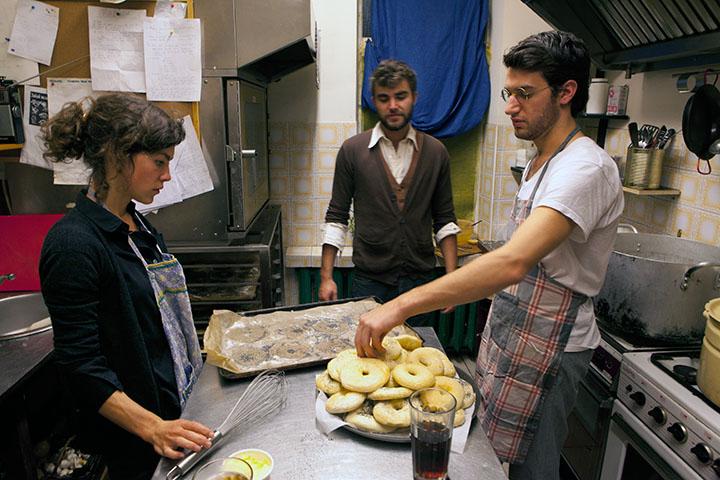Elena Narbutaitė, Menachem Kaiser and Jake Levine, October 15, 2010, preparing bagels for the first public bagel party and presentation of the Vilnius Bagel Project. Yalta Restaurant kitchen, Vilnius, Lithuania.
Menachem Kaiser grew up in Toronto, eating bagels. Lots of bagels.
“Breakfast, you eat a bagel.” His Orthodox Jewish high school served them for breakfast every morning.
After he graduated high school, he went to Columbia University in New York, where he ate more bagels. Life was good. Then he got a Fulbright scholarship and left the States for Vilnius, Lithuania, only to discover there weren't any bagels.
"There [was] a dearth of bagels. There [was] like a bagel famine," he says.
What was really shocking to him was that no one there knew anything about bagels.
“There was just nothing bagel anywhere,” he says.
Suddenly, Kaiser’s research took a carbo turn. He learned that while the bagel wasn’t born in Lithuania, it definitely grew up in the neighborhood. It was parboiled into life in Poland and spread throughout Jewish communities in Eastern Europe.
“You see photos from Poland, from Lithuania. The marketplaces would make a long string of bagels — they called it a ‘wreath of bagels,’" he says. "They’d just run a string right through the holes and dangle them in the marketplace.”
All that ended with World War II. Lithuania’s Jewish population was decimated. Before the war, Vilnius was 45 percent Jewish. Today, it’s less than 1 percent.
Most of its Jewish culture was erased, which meant, among other things, no bagels.
That last bit gnawed at Menachem Kaiser. One night, after a few drinks with his American roommate, Jake Levine, and some Lithuanian friends, he had an epiphany — they should make their own bagels.
The Lithuanians took up the idea with a holy zeal, plastering the city with posters announcing the first bagel party. A local restaurant donated space for the night. It was on.
Just one problem, though: No one knew how to make bagels.
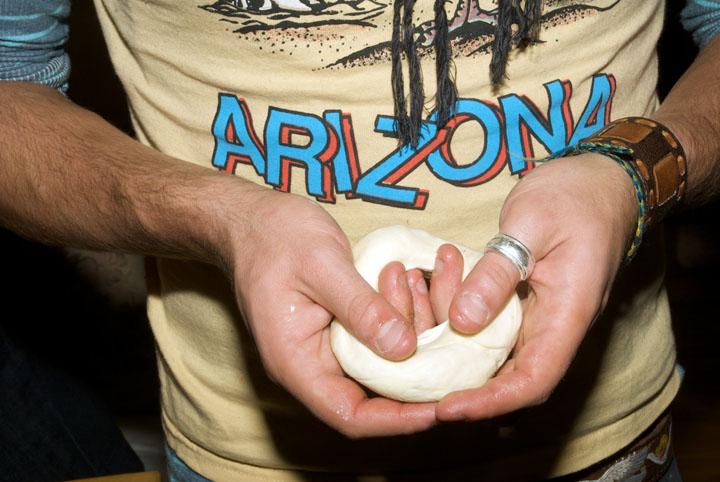
“There was a lot of scary moments in the bagel making process,” Kaiser says.
And the bagels didn’t rise very well.
“They were kind of flat, a bit like a pancake with a hole,” says Elena Narbutaite, one of the Lithuanian friends who helped make it all happen.
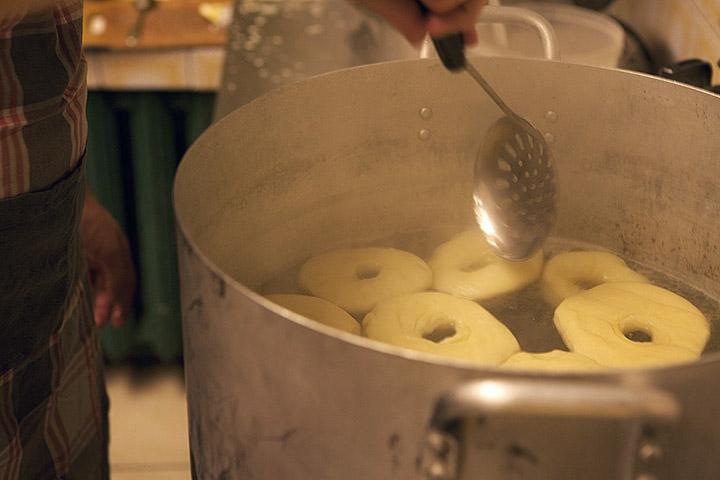
The party itself was a big success. Hundreds of people came, including diplomats from the American Embassy and Lithuanian celebrities. The local press covered the event. The bagels were gone in minutes.
“We were filled with joy because finally bagels were brought back,” Narbutaite says.
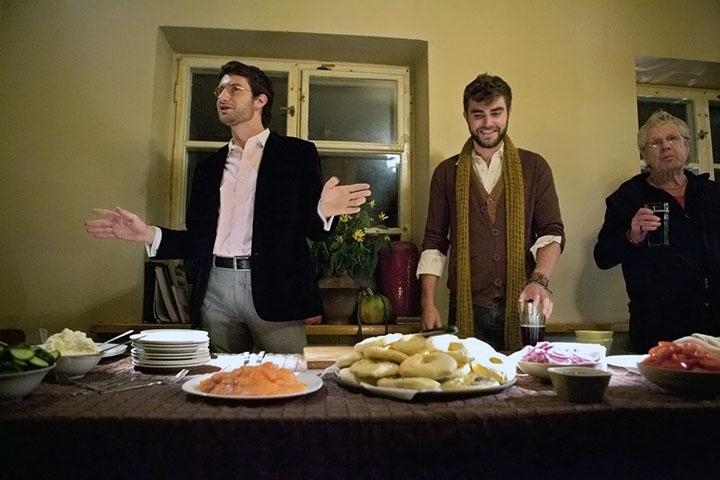
Menachem Kaiser and his friends continued to hold bagel events throughout the year. After he went home to the US, he wrote up the story of his Lithuanian bagel adventure for Tablet Magazine.
“Very cute, very just like, ‘we came to Lithuania, we made bagels, and everyone loved our bagels.’ That was it,” Kaiser says.
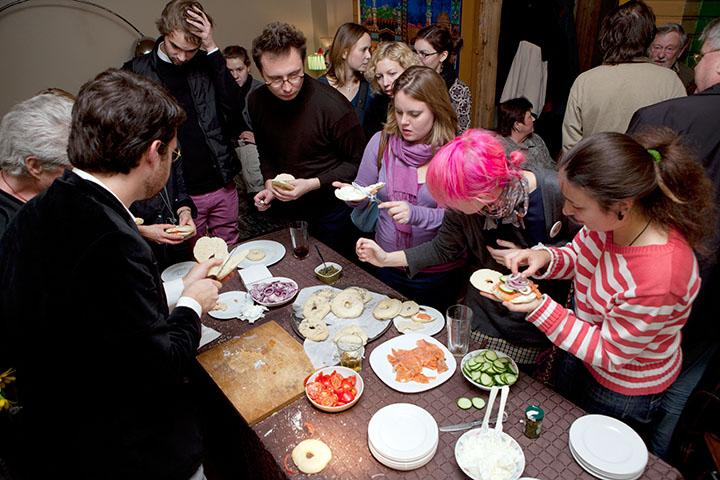
What’s not to love, right? But that’s when things took a really dark turn.
“We got a comment from … Efriam Zuroff, who is the head of the Simon Wiesenthal Center in Israel, who is by all accounts is the world’s most prominent Nazi hunter, and he was very upset,” Kaiser says.
In his comment, Zuroff wrote that given Lithuania’s “ongoing efforts” to hide or minimize their complicity in Holocaust crimes, “one would imagine that two obviously-intelligent Jewish Fulbright scholars in Lithuania there to study contemporary Jewish issues, would be able to come up with something more meaningful than reintroducing Lithuanians to bagels.”
Kaiser, who was upset by the comments, says he wrote Zuroff an open letter, and Zuroff responded.
“At the time I was very worked up and kind of panicky about it, but in retrospect I think it’s an interesting debate,” Kaiser says. “For me, I think this is a positive development: Let’s everyone eat bagels together. It’s kind of like a safe space to re-enter a lot of complicated, messed up history. But here’s the bagel.”
Kaiser has moved on to other projects. But Elena Narbutaite kept perfecting her bagel-making skills in Vilnius.
“It just clicked in my mind that I could try to sell them,” she says. “It started really like black market bagel selling, like illegally, you know, popping out at courtyards or parties in the middle of the night.”
She’s since gone legit, selling her bagels on Sundays at Café de Paris.
Now, a bagel renaissance is under way. Last December, Hales Bistro, a bagel café, opened in Vilnius’s Old Town. This year, they began supplying the Jewish Cultural Center with bagels for their own new café.
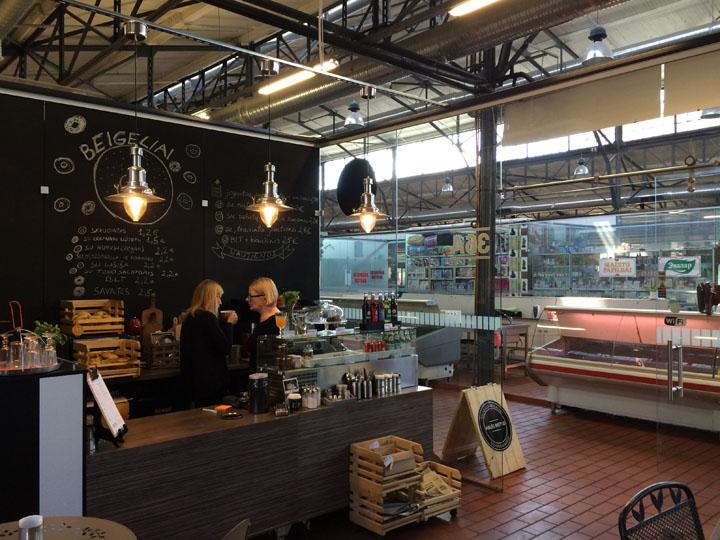
Another bagel joint, run by the owners of the Donut Lab, is scheduled to open this month.
“It’s amazing because now we have bagels in Vilnius for real,” Narbutaite says.
But does it all lead back to Kaiser’s bagel party? When I reached out to Nomeda Kuodiene, co-owner of Hale’s Bistro, she laughed and said, “Nope, I wasn’t invited to the party.”
Nomeda discovered bagels on a trip to New York while visiting relatives. But Narbutaite says she doesn’t think the current bagel revival is a coincidence.
“Because sometimes ideas have a tendency to be in the air, you know?”
The bagel’s time had simply come — again. Only this time, it’s non-Jewish Lithuanians like Narbutaite and Kuodiene doing all the parboiling.
Kaiser thinks that’s just fine, because from his point of view, bagels are for everyone.
And this summer, when he heads back to Lithuania for a visit, he’ll finally be able to realize his dream, and eat bagels every day in Vilnius.
But does he have any other plans? Maybe a bialy party?
“The bialy? No, I want the flagel. To me that’s the evolution. The flat bagel. Flagels are amazing,” he says.
Every day, reporters and producers at The World are hard at work bringing you human-centered news from across the globe. But we can’t do it without you. We need your support to ensure we can continue this work for another year.
Make a gift today, and you’ll help us unlock a matching gift of $67,000!
